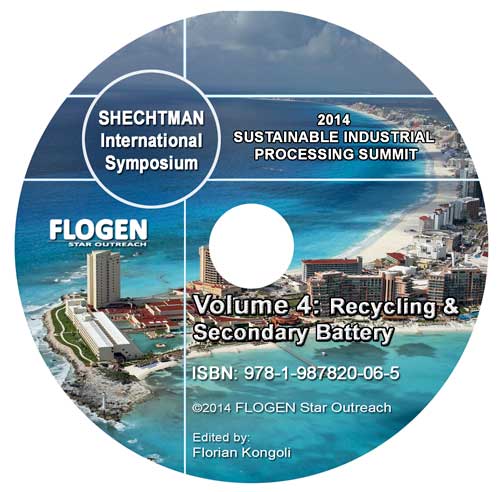2014-Sustainable Industrial Processing Summit
SIPS 2014 Volume 4: Recycling & Secondary Battery
| Editors: | Kongoli F |
| Publisher: | Flogen Star OUTREACH |
| Publication date: | 20 December 2014 |
| Pages: | 498 pages |
| ISBN: | 978-1-987820-06-5 |
| ISSN: | 2291-1227 (Metals and Materials Processing in a Clean Environment Series) |

CD shopping page
Carbstone process: A novel technology for the valorisation of steelslags and CO2
Mieke Quaghebeur1; Peter Nielsen1; Dirk Van Mechelen2; Olivier Malek2; Ben Laenen1;1VITO NV, MOL, Belgium; 2RECMIX, 3600, Belgium;
Type of Paper: Regular
Id Paper: 363
Topic: 5
Abstract:
The recycling of slags provides a number of environmental benefits, including the preservation of natural resources (limestone), the recuperation of valuable metals and the reduction in solid waste. Stainless steel slags, for example, contain on average around 5% of stainless steel. To recuperate the metal contained in the slags, crushing or grinding of the slag is necessary. The grinding, however, results in a fine grained mineral residue that is difficult to recycle in current applications due to both technical and environmental challenges.
A novel technology was therefore developed to enable the valorisation of fine grained non-hydraulic slags and ashes into high quality construction materials. The process makes use of accelerated carbonation by treating various kinds of slags with CO2 at elevated pressure (5-20 bar) and temperature (up to 140°C) without addition of binders. The carbonates that are produced in-situ during the carbonation reaction act as a binder cementing the slag particles together. The carbonated materials can compete with concrete products (C35/C45) and have excellent environmental and technical properties. The materials have the additional advantage of sequestering 180-200 g CO2/kg slag. The technology was developed on lab scale by optimisation of the process parameters with regard to the uptake rate and the properties of the building materials (chemical, mechanical and leaching).
In this paper, an overview will be given of the results obtained with regard to upscaling and further validation of the curbstone process.